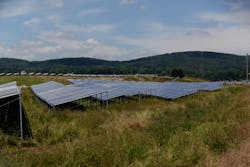Ameresco adding 6-MWh Battery Storage to Solar installation at Army's Fort Detrick
The U.S. Army and Ameresco are working together on a 6-MW/6-MWh battery energy storage system at Fort Detrick Army Garrison in Maryland.
The collaboration adds the BESS system to an existing 18.6-MW solar facility (pictured) at Fort Detrick. Ameresco’s Federal Solutions Group is guiding the project from the developer side.
The teams predict that the battery system will add cost savings of $125,000 annually for the government. The Fort Detrick BESS is expected to be completed in early 2023.
“The resiliency of our installations is an important priority for the Army,” said Paul Farnan, Acting Assistant Secretary of the Army for Installations, Energy and Environment, in a statement. “This BESS aligns with the Army’s Installation Energy and Water Strategic Plan to provide installations with energy resilience, efficiency, and affordability to enhance readiness.
Ameresco and the Army earlier worked together on the 18.6-MW solar site at the fort. Ameresco completed the work in 2016, installing nearly 60,000 solar panels, nine central inverters and transformers, as well as overhead and underground distribution.
That system supplies close to 12 percent of Fort Detrick’s annual electric load requirements. The 6-MWh battery will also provide frequency regulation services to grid system operators in Pennsylvania, New Jersey and Maryland.
The installed BESS will be microgrid-ready, allowing for future additions at Fort Detrick. The U.S. Army recently announced a long-term energy plan calling for microgrids at all installations by 2035.
Related stories
U.S. Army Climate Strategy: Microgrid on every base by 2035
Microgrid at Fort Hood successfully islands from the Main Grid
Free EnergyTech webinar: Making Sustainability the Keystone of Mission Critical Energy Goals
Subscribe to our free, tri-weekly Email Newsletter for more Insights into the Mission Critical Energy Transition
Fort Detrick is located in Frederick, Maryland. It is home to the U.S. Army Medical Research and Development Command. It includes the Army’s bio-defense Agency –the Medical Research Institute of Infectious Diseases.
Fort Detrick is considered a top global research campus for biological agents that require special containment. On the 1,200-acre site it also holds the National Cancer Institute offices for Frederick.
It reopened in 2020 after a year-long closure due to an investigation into alleged breaches of containment
The U.S. Army plans to reduce net greenhouse gas emissions 50 percent by 2030 (compared to 2005 levels)) and net-zero by 2050.
-- -- --
(Rod Walton, senior editor for EnergyTech, is a 14-year veteran of covering the energy industry both as a newspaper and trade journalist. He can be reached at [email protected]).
About the Author
Rod Walton, EnergyTech Managing Editor
Managing Editor
For EnergyTech editorial inquiries, please contact Managing Editor Rod Walton at [email protected].
Rod Walton has spent 17 years covering the energy industry as a newspaper and trade journalist. He formerly was energy writer and business editor at the Tulsa World. Later, he spent six years covering the electricity power sector for Pennwell and Clarion Events. He joined Endeavor and EnergyTech in November 2021.
Walton earned his Bachelors degree in journalism from the University of Oklahoma. His career stops include the Moore American, Bartlesville Examiner-Enterprise, Wagoner Tribune and Tulsa World.
EnergyTech is focused on the mission critical and large-scale energy users and their sustainability and resiliency goals. These include the commercial and industrial sectors, as well as the military, universities, data centers and microgrids. The C&I sectors together account for close to 30 percent of greenhouse gas emissions in the U.S.
He was named Managing Editor for Microgrid Knowledge and EnergyTech starting July 1, 2023
Many large-scale energy users such as Fortune 500 companies, and mission-critical users such as military bases, universities, healthcare facilities, public safety and data centers, shifting their energy priorities to reach net-zero carbon goals within the coming decades. These include plans for renewable energy power purchase agreements, but also on-site resiliency projects such as microgrids, combined heat and power, rooftop solar, energy storage, digitalization and building efficiency upgrades.

